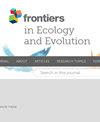森林道路是加拿大东部北方森林中震颤杨的栖息地走廊
IF 2.4
3区 环境科学与生态学
Q2 ECOLOGY
引用次数: 0
摘要
因修建和维护林区道路而形成的边缘生境有利于先锋、耐阴和适应干扰的植物物种。人们经常研究道路对非本地物种扩散的影响,但很少有研究关注道路对本地树种的影响。我们研究了森林道路对加拿大东部北方森林景观中颤抖杨(Populus tremuloides Michx.)扩展动态的影响。我们确定了道路是否是震颤杨的栖息地和扩散走廊,以及沿道路建立的种群是否是震颤杨向邻近林分扩展的起点。我们通过调查 694 公里道路沿线的植被,评估了森林道路对颤杨分布的影响。在 19 个林分中,我们比较了与道路平行和垂直的 100 米横断面上的个体密度和年龄,以确定道路的作用。森林道路网沿线有大量颤抖杨。森林道路有时会成为颤抖杨的栖息地走廊,但其对颤抖杨密度的影响只延伸到道路两侧很短的距离(10 米)。森林道路并没有成为震旦杨向邻近林分扩展的起点。林间道路是特别有利于欧洲山杨生长的栖息地。虽然道路并不是杨树向道路以外扩散的起点,但这些栖息地在受到干扰后很容易受到入侵,从而减少有机层的厚度。本文章由计算机程序翻译,如有差异,请以英文原文为准。
Forest roads act as habitat corridors for Populus tremuloides in the boreal forest of eastern Canada
Edge habitats resulting from the construction and maintenance of forest roads favour pioneer, shade-intolerant and disturbance-adapted plant species. The effect of roads on the spread of non-native species has been frequently studied, but few studies have focused upon their effects on native tree species. We studied the effect of forest roads on the expansion dynamics of trembling aspen (Populus tremuloides Michx.) in a boreal forest landscape of eastern Canada. We determined whether roads act as a habitat and dispersal corridor for trembling aspen, and whether populations that established along roads act as a starting point for aspen expansion into adjacent stands. We evaluated the effect of forest roads on the distribution of trembling aspen by surveying the vegetation along 694 km of roads. In 19 stands, we compared the density and age of individuals in 100 m transects established parallel and perpendicular to roads, to determine the role of roads. Trembling aspen is abundant along the forest road network. Forest roads act sometimes as habitat corridors for trembling aspen, but their effects on its density extend only over a short distance (10 m) on each side of the roads. The forest roads did not act as a starting point for the expansion of trembling aspen into adjacent stands. Forest roads are particularly favourable habitats for trembling aspen. Although roads did not act as a starting point for aspen dispersal away from roads, these habitats would be vulnerable to invasion following a disturbance that would reduce the thickness of the organic layer.
求助全文
通过发布文献求助,成功后即可免费获取论文全文。
去求助
来源期刊

Frontiers in Ecology and Evolution
Environmental Science-Ecology
CiteScore
4.00
自引率
6.70%
发文量
1143
审稿时长
12 weeks
期刊介绍:
Frontiers in Ecology and Evolution publishes rigorously peer-reviewed research across fundamental and applied sciences, to provide ecological and evolutionary insights into our natural and anthropogenic world, and how it should best be managed. Field Chief Editor Mark A. Elgar at the University of Melbourne is supported by an outstanding Editorial Board of international researchers. This multidisciplinary open-access journal is at the forefront of disseminating and communicating scientific knowledge and impactful discoveries to researchers, academics and the public worldwide.
Eminent biologist and theist Theodosius Dobzhansky’s astute observation that “Nothing in biology makes sense except in the light of evolution” has arguably even broader relevance now than when it was first penned in The American Biology Teacher in 1973. One could similarly argue that not much in evolution makes sense without recourse to ecological concepts: understanding diversity — from microbial adaptations to species assemblages — requires insights from both ecological and evolutionary disciplines. Nowadays, technological developments from other fields allow us to address unprecedented ecological and evolutionary questions of astonishing detail, impressive breadth and compelling inference.
The specialty sections of Frontiers in Ecology and Evolution will publish, under a single platform, contemporary, rigorous research, reviews, opinions, and commentaries that cover the spectrum of ecological and evolutionary inquiry, both fundamental and applied. Articles are peer-reviewed according to the Frontiers review guidelines, which evaluate manuscripts on objective editorial criteria. Through this unique, Frontiers platform for open-access publishing and research networking, Frontiers in Ecology and Evolution aims to provide colleagues and the broader community with ecological and evolutionary insights into our natural and anthropogenic world, and how it might best be managed.
 求助内容:
求助内容: 应助结果提醒方式:
应助结果提醒方式:


